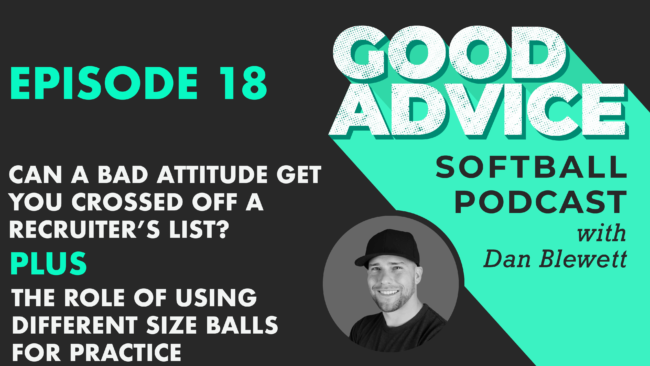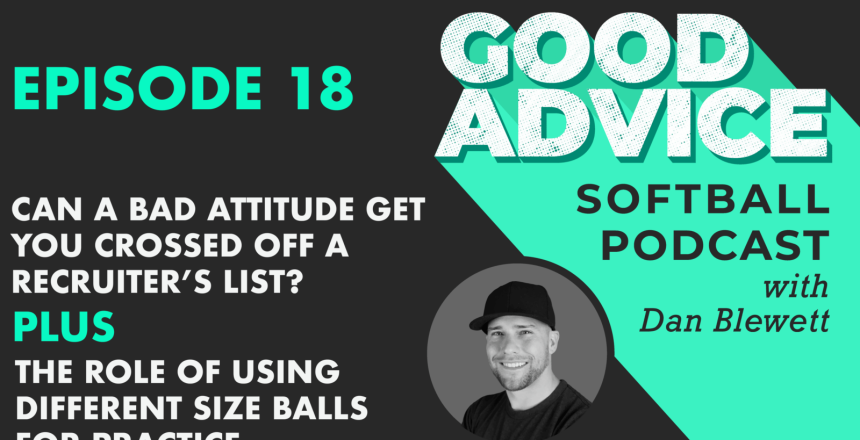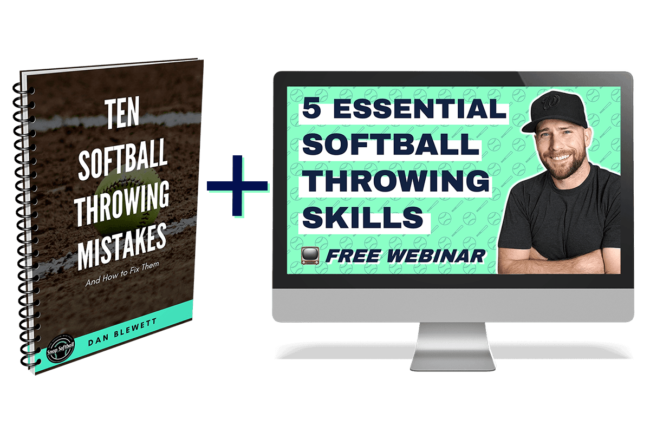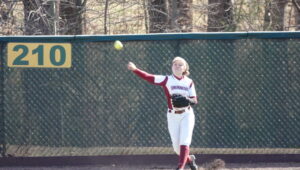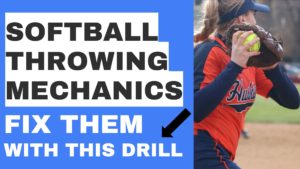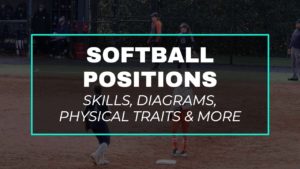*This article may contain product links which pay me a small commission if you make a purchase. Learn more.
Will your daughter get crossed off a recruiter’s list if she has a bad attitude? Dan talks through how the character of an athlete can play a big role in the recruiting process. Also in this episode, Dan discusses the role of using different size balls for practice and how that can be beneficial for softball players.
Try the Early Work Strength Program for free here.
To submit a question for the Good Questions Q&A segment, make a voice recording and email it to Dan at hello@danblewett.com. Want to support the show? Enroll in one of Coach Dan’s online throwing courses or his mental skills course. Use code GOODADVICE to save 20% on any course, just for being a listener. Sign up for Dan’s Email list and get his free throwing eBook, and follow up with him on the interwebs: YouTube Channel | Twitter | Snapsoftball.com
Podcast: Play in new window | Download
Subscribe: Apple Podcasts | Spotify
Transcript: EP18 – Can a Bad Attitude Get You Crossed Off a Recruiter’s List? Plus, The Role of Using Different Size Balls for Practice
You are listening to the Good Advice, softball podcast. I’m Dan Blewett. And on this show, you’ll learn how to help the softball player in your life. Sharpen her skills, improve her mindset and find new confidence through softball.
Welcome back to the good advice softball podcast. I’m Dan Blewett. And on this episode, we’re going to talk about two main things. Number one. Will your daughter get crossed off a list if she has a bad attitude. So college recruiters come to find out that she maybe has a hot temper or gets really down on herself as a bad teammate.
Any of those things will that actually get her cross off a college recruiters list? And secondly, what is the role of using different size balls for practice? So little wiffle balls, baseballs, tennis balls, soft balls, heavy balls, all those different ones they can use for hitting for throwing, for fielding, all that different stuff.
I think they’re used more often in baseball than softball, but I want to talk through a little bit of some of the pros and cons in today’s episode.
All right. So first thing, will your daughter, get cross off a list if she’s got a bad attitude? So the answer is probably possibly, so college recruiters do a pretty good job of, digging and they do a pretty good job of figuring out. Who players are, what their strengths and weaknesses are, what their work ethic is like.
Are they a good teammate? Are they respectful to coaches? All that sort of stuff? And now there’s always exceptions to this. I mean, I’ll be perfectly honest. We’ve had a, I can think of one right now. A baseball player who was kind of crappy. I mean like his attitude was kinda crappy. He was not a great teammate.
He’s still found a place to play in college. Now he was the kind of kid that I hoped a college recruiter didn’t call me because I’m never I’ll sugar coat things as best I can. I’ll put them in as best light as best I can. And, but I won’t lie. Right? So for him, I was hoping no one called because I didn’t want to have to lie.
And again, I wouldn’t, so I didn’t want to be placed in a position where I was, I don’t know, no negatively impacting his future, but at the same time for me to ship other kids out to other schools, I have to be honest with recruiters because they will figure it out. If I lie for a player. And, you know, they’re going to call for their coaches anyway.
So they’re going to figure out, Oh, Dan, wasn’t really truthful with us because we get four similar opinions from these other coaches. And Dan’s opinion was very, very different. And then, you know, they find out over time anyway. So, you know, now that being said, there’s still probably a place for everyone because at some smaller schools where they are, begging for talent and don’t as much have the luxury.
Of picking and choosing where they got all these premium athletes and they’re going to take the ones that have the best, you know, ability, but also the best character. Also the best academics, you know, obviously as the ladder goes down, schools have to be less choosy. So they might give a kid who has maybe a not stellar reputation, a chance.
And you say, Hey, like maybe, he or she grows up and, we end up getting a bargain or maybe we don’t. And she ends up being the same, you know, Troublemaker that we heard that she was. So, you know, if a player is not getting any looks at all, you know, that’s not to say that it’s going to, it’s probably not because of just her attitude.
Again, there’s going to be a continuum. So, you know, you’ve got to be, if you, if it’s a slim chance of playing at a certain school, like your dream school is a, you know, everything’s got all the stars have to align. You’ve got to be. Great academically, great character references, obviously outstanding on the field.
You know, if all those don’t align, then you’re probably not going to get your chance at the, picky school that is maybe your dream. But again, as the funnel and the level of talent at a school diminishes, you know, you get to lower levels again, they don’t have the luxury of being quite as choosy.
So the answer to this question is. Yes, you can certainly, and players absolutely do get crossed off recruiter’s lists by, you know, that on the field performance, but also by bad body language, being a bad teammate, not handling adversity. Well, not handling, you know, poor performance, well, making errors in the field, being a hothead, mouthing off the coaches, those are things that do not fly well.
And coach, will you just be like, you know, they’ll scratch you off the list right there. But again, not every school will, so it just depends. They really need an outfield or they really need a shortstop. And, you know, times it’s getting down to the wire or whatever, they might give a kid a chance to grow up and hopefully improve their character and all that stuff over time.
But again, I think a lot of coaches know that. You know, players don’t change their personality overnight and they don’t magically change either. So they’re pretty wary about being stuck with someone. Who’s going to make them as coaches miserable for three or four years. Because as a coach, you want to have your program run the way you want it, and you want it to operate smoothly and you want to have fun at your job and a couple players that.
Make you miserable can spoil the whole experience. It doesn’t take more than a couple of bad apples to do that. So they are wary. So for you parents out there, you do need, uh, you know, I don’t know that it’s going to help you nagging your kids. If you’re like, Hey, you know, you keep kicking dirt after you make an error, it’s going to get you.
I think they’re gonna have to learn the hard way. The problem is that. They won’t know when they’re crossed off a list of scout will come and silently watch and silently crossed off the list and you’ll never know you’re ever in the running for them. And that’s the unfortunate part. And the same thing happens with parent behavior, which I’ve talked about in the past, you know, parents and the bleachers, if you’re that psycho dad or that psycho mom or that psycho grandparent in the bleachers Scouts, we’ll try to figure out whose parent.
Or a grandparent you are, and they’ll say, Oh, that’s the dad of number 12, you know, and I’m probably gonna not go with number 12, if he’s going to be a part of the package deal here. So be wary of that. And, again like college recruiting, they have more choices than ever there’s players sending them videos from all over the country.
So they do have the luxury of being more choosy, even at lower levels. And so they will select for character as much as they possibly can. Again, I’ve seen examples where they don’t, like I said, I had a player who was, pretty, obviously not a great body language kid, just in general. Like not someone that I would highly recommend to his school.
He just like, didn’t have a very good attitude to be quite Frank about it. He still found a place to play in college. Did he drop out a year later? He sure did. Because he didn’t handle adversity very well. And, you know, College sports are hard, so that wasn’t surprising either that he didn’t last very long in college athletics, but again, it’s a highly individual thing, but you should be very aware and, you know, pass this podcast along to your daughter.
She needs a different voice. And that’s part of it too. When they hear different voices, nagging them or urging them on other than mom and dad. That helps a lot. So fair warning for everyone. You can certainly get crossed off a college recruiters list with bad behavior, character references, et cetera.
All right. Topic number two today. I think softball. Tends to use only softballs a lot more than they should. And I’m not exactly sure why, and I could be wrong about this trend, but from everything I’ve seen. I don’t see softball players practicing with baseballs, with tennis balls, with like the little tiny wiffle golf balls or any of those practice tools.
I don’t see them practice with them quite as much as in baseball. And I compare the two sports a lot, and I think it’s, it’s interesting just seeing the differences because softball does some things well, compared to baseball, baseball does some things better compared to softball. They’re essentially identical sports, just like little detailed, obviously the way the pitchers pitch size of the field, stuff like that.
But all the core skills are similar. So when you’re talking about development, number one, especially with the younger players, you know, young girls have small hands and this is one of the chief reasons. I think girls struggled to have good throwing mechanics is because they’re held back. By having a small hand relative to the ball size when they’re young, even though they use the smaller balls early, they graduate to the full softball, pretty fast.
And those tiny hands mixed with a pretty large ball. Doesn’t add well doesn’t bode well for good throwing mechanics now. Well beyond throwing mechanics, smaller balls, they are great for handling coordination and hitting. You know, one of the things a lot of Latin American kids do developing is they’ll hit.
You know, little tiny bottle caps with a broomstick they’ll hit sunflower seeds with a blue, the broomstick they’ll hit a little black beans with a broomstick, and these are all really great tools that you can take out of, you know, the, the back alley, you know, playing backyard baseball, and you can apply them to baseball.
You can apply them to softball just as equally. So, and again, I don’t think that’s something I see that much in softball. I’m not sure I’ve heard of many softball teams taking a, you know, a bag of kidney beans out to practice and, and bring a broomstick. And having a station where they’re working on really fine hand-eye coordination, so like that, but there’s definitely something to that where if you’re trying to build the ability to square up the ball, Why are we limiting ourselves to this huge yellow softball, you know, get a ball that’s a little more challenging and color that blends in a little more.
That’s not so high visibility. Make their challenge, their eyes a little bit, go from different distances and use baseballs. Use tennis balls use. Anything smaller is going to be tougher to square up, obviously, and thus have a performance enhancement effect on hand-eye coordination and the ability to center to find the center of the ball.
When you’re hitting, obviously the same goes when you’re fielding. So I love fielding drills down a tennis court with a tennis ball with no glove. Those are awesome. You can use the rebounder, you can bounce them to each other. You’re really good hops. It’s a great way to work on in between hops and short hops and long hops, all that stuff.
Those are very, very underrated, little easy practices that are kind of fun. The same thing goes there. You can use smaller balls, you can use paddles, all those other training tools. But again, I would just urge any softball coach listening to. Think outside the box, as far as the training aid that you’re using and don’t limit yourself just to softball and just think of the ball size is just, it needs to be uniform obviously in the game, because that’s how the, you know, the rules dictate.
But outside of that, you know, why not hit. Baseball is ground balls. They’re going to be smaller. It’s going to be tougher to feel them. Why not use tennis balls for fielding drills? Why not hit the mini golf balls that have little holes and little mini golf, wiffle balls? You know, why not hit a bag of kidney beans, every practice into the outfield with a broomstick?
You know, any of those things, any of those variations are going to be fun. They’re going to mix things up. You know, and again, they’re going to challenge hand-eye coordination and all that stuff. So. Just think about what you can do outside the box to improve your practices, to improve hand-eye coordination, to make things fun, to mix things up.
Those are all good things you can do to improve the quality and fun of your practice.
Well, that’s all the good advice I’ve got for today. If you enjoy the show and would like to support me while also helping yourself enroll today in one of my online softball courses, my She’s Got a Cannon throwing courses, come with pricing plans for any budget. And my Resolute Athlete, mental skills course will help your daughter or team build the mindset of a champion.
Enroll in any of my courses through the links in the show notes and save 20% with code good advice just for being a listener. Be sure to subscribe to my weekly email list where you’ll get updates on all my new videos and episodes, nearly 4,000 people get my emails and you should to sign up for the link in the show notes.
Lastly, who do you know, who can use some good advice? Please share this podcast with a friend, subscribe on iTunes, Spotify, or wherever you listen to podcasts and subscribe to them. Snap softball, YouTube channel, where you’ll find this podcast and hundreds of softball, instructional videos. Back when I was a player, I was always thankful for good coaches and good advice.
I’m Dan Blewett and I’ll see you next time.

